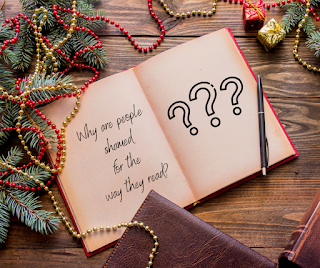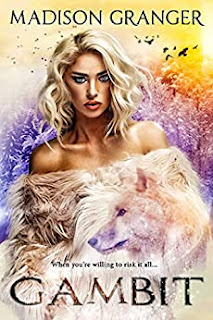Reading is Reading: Combatting Shaming Reading Preferences
Bear with me, my mind is an endless abyss of twine right now. Seriously, if I could snap a photo of my thought process and show it to you it'd look like one of those yarn boards from a cop show where they're trying to catch a serial killer.
I've been planning this post for a while now, but I needed to get my thoughts in order before I wrote it. Funny how that didn't happen. Right now there is no such thing as getting my ducks in a row. I don't even have ducks. I have cats that are hopped up on LSD, jumping from wall to wall. There is no order. Especially since I had a depressive episode yesterday and decided to hit the reset button. Meaning all meds but one is out of my system right now because I needed to get my hormones balanced.
Anyway, the idea for this post came to me from my younger sister. She and I do a lot of book reviewing, as you may know. We run in the same author circle so we tend to review a lot of the same books. However, when we are reading books, not by our friends, we go in two completely different directions. I favor contemporary romance, young adult fiction, and fantasy. She favors crime stories, murder mysteries, and historical fiction.
She and I were talking about a couple of the books we were reading two weeks ago and it led her to sigh. She said, and I quote, "You know how I listen to books while I do homework and stuff? Someone got mad at me for leaving a review on their book when I listened to it. I left a great review, too. I loved the book, but they were mad. I don't know if I'm going to read any more of their books."
What. The. Hell. Pardon my French, but SERIOUSLY?!?!?!
I didn't know what to say to her. Being the older sister I am, my first reaction was to be pissed off. I wanted to contact that author and give them a piece of my mind, but I didn't. My sister has to pick her own battles and she didn't come to me to enlist a soldier. She came to me to confide. So, let's break this down for a moment.
There are three basic types of book formats physical, digital, and audio.
Physical books come in either paperback or hardcover format. These are books readers can physically hold in their hands. Bookmarks are often found nestled in the pages of this format.
Digital books are ebook files that can be purchased to read on phones, tablets, computers, and so forth. These books are an easy choice for busy people on the go because you can literally take them anywhere with you. They're lightweight and allow you to have an entire library at your fingertips.
Audiobooks are digital files that read a book to you. They are purchased through CD, digital stores, or if you're really old-school cassette tapes. This format is popular for busy readers, drivers, and readers with disabilities.
As far as price points go...
Paperbacks: $5-14
Hardcovers: $13-22
Ebook: $0.99-$14
Audio books: $14+
Now, if you are an author you probably understand why these prices are what they are, but if you're a reader you might not. The basic equation for figuring out a book's cost is print cost + distribution cost + resources used (i.e. narrator, recording studio, editors, illustrators..etc.) + author royalties = total cost. Thus, it's no wonder audiobooks cost more, despite them being a way disabled readers can enjoy books.
There is a fourth option for readers, though, that not many people think about and that apparently some authors have an issue with.
Ereaders have a nifty little thing called text-to-speech. Text-to-speech is when your reader reads whatever is on your screen to you. I know several people who use this option. I even use this option.
Text-to-speech is an ebook file that comes as all ebook files do, where you have the book on your device. You can see the words, you can read the words, and most devices offer an automatic review system that prompts you to review the book once you finish reading. However, if you select text-to-speech on your device, it will read the book to you with the words on the screen. This allows readers to either follow along or listen while doing other things.
I'm going to admit here, I am a fan of text-to-speech. My dad and one of my sisters are dyslexic. They use text-to-speech to read books because audiobooks are expensive and their eyes flip-flop letters. Both my dad and this sister listen to their books at a regular speed because they have a slightly below-average reading speed. This allows them to comprehend what they are hearing just like if they could read it off the page themselves.
My other sister and I up our speed when we use text-to-speech. She usually uses speed 1.5X and I use 2X. I have a high reading speed. I read quickly in my head and can retain the information. So, a 2X speed doesn't affect my ability to understand and enjoy the story. The same goes for my sister that reads at 1.5X.
Now, here's what pisses me off. Why does it matter what format a reader enjoys a book in?
IT DOESN'T MATTER.
Shaming a reader for enjoying a book in their chosen format is discrimination, people. What if your reader is dyslexic and loves books but can only enjoy them by listening to them? What if your reader is on a budget and can only purchase ebooks? What if your reader is blind? What if your reader is a full-time college student with a job and simply doesn't have time to read as much as they want? What if your reader is working two jobs, spends their entire day in front of a screen, and just wants to give their eyes a break while enjoying a story?
Your job as the writer is not to critique your reader's reviews, format choice, or reading style. You're not their freaking Language Arts teacher. Your job is to write the dang story. After that, the ball is in your reader's court. Stop. Shaming. Your. Readers. For. The. Way. They. Choose. To. Read.
After my sister told me about how an author shamed her, I posted a poll in my reader group on Facebook. I did this simply to see which formats my readers were using because I honestly never asked my readers what format they use and I was curious.
I have almost 500 members in my reader group. Out of those 500 members, 67 felt comfortable enough to answer my poll. I wasn't going to hound people for answers, because your reading format preferences are personal information. So, I tagged a few authors and readers I knew would answer, then let the other members answer as they felt compelled to.
Out of those 67 people 30 of them read physical books (huh, would you look at that. Less than half the number of people who voted read actual physical books), 25 people read Ebooks, 8 people read audiobooks, 2 read Text-to-speech, and 2 preferred listening to a friend read the books.
Taking this a step further, I had 90 people who saw the poll. Meaning 23 people did not feel like they could share their reading preferences for one reason or another.
I received 22 comments on this poll and almost all of them were from the people who read audiobooks, use text-to-speech, or listen to friends read. These comments were explanations about why they chose to listen to their books instead of reading them to themselves.
Do you know what this tells me? It tells me that these readers are self-conscious about their chosen formats. Now, I'm not saying it's because they've been shamed before, but I am saying there is a possibility that's why.
Reading is reading, people. Like everything in life, there is no single way to read.
You wouldn't tell a kindergartener that they aren't reading simply because they're sitting on the floor listening and comprehending while you read aloud about a llama who's scared of the dark. If you wouldn't say it to a kindergartener, then you shouldn't say it to anyone.
Here's the thing, my entire life revolves around screen time. I work at a local newspaper as a writer and spend at least 85% of my time in front of a computer or answering texts on my phone. Then I go home and I'm an author, where I spend even more time on my computer writing. To write this blog post, I am staring at a screen. I enjoy playing video games, they help me shut off my mind, that's even more screen time.
I look forward to going home every night, laying on my bed, and playing with my cats while my phone reads to me from across the room. I look forward to not staring at a screen. You could say, "but Ashes, you should read the physical book instead". 1) If I bought every book I wanted to read in a physical copy I would never be able to eat again. 2) If I was holding a physical book in my hand, I couldn't be holding a cat wand and I only get to see my cats for roughly 4 hours a day when you consider work time and sleeping. So, yeah, I'm pretty selfish about my time with them.
This post may come off as a little heated, because as I'm writing it I'm getting irritated thinking about all the readers who have been told, "Your review doesn't count because you didn't actually read my book". You know what I have to say to authors who are like that? F*** you!
Unfriend me, if you want. Leave my reader group. Never look at this blog again. I rarely express my hard opinions but this is one that I will not budge on. Your readers have the freedom to enjoy a book in any format that lets them experience it and, honestly, if you have a problem with the way your readers read then maybe you should think about a new career.
Writing is an art. Reading is interacting with that art. It is total immersion into a story. How your reader gets to that point, shouldn't matter. So, please, please, please, stop shaming them.




Comments
Post a Comment